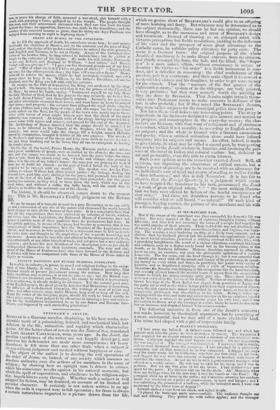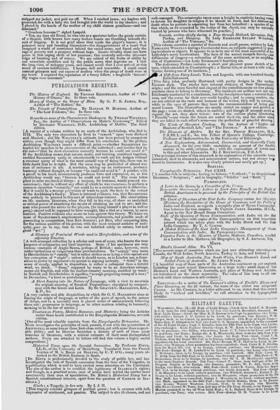SPINDLER'S JESUIT.
SPINDLER is a German novelist, displaying, in his best works, con- siderable merit of a painstaking, learned, and mechanical kind, but deficient in the life, animation, and rapidity which characterize genius. Of the bet ter class of novels was the Nauru/ Sun, translated by Lord ..A.LHERT CONYNGHAM, Some years ago. In the Jesuit, the peculiar excellences of the writer are not happily develepe.1, and therefore his deficiencies are made more conspicuous ; tbr heavy literalness is felt more than any other fault, when a subject is chosen without judgment and treated without happiness or care. 'I he object of the author is to develop the evil operations of the order of Jesus, or, indeed, of any society which assumes an absolute authority over the actions of its members in the mune of religion ; by showing how au upright num is driven to crimes, which his conscience revolts against in his rational moments, but which the spell of' superstition, and obedience to his religious supe- nor, impels hint to carry through. Whether such a subject is well adapted for fiction, may be doubted, on account of its limited and peculiar character. It certainly is not sinless written in an age when the evils it exposed were in full operation ; for there is always a certain naturalness imparted to a picture drawn from the life, which no genius short of SHARSPEARE'S could give to an offspring of mere learning and fancy. But whatever may be determined as to the subject abstractedly, there can be but one opinion, we should. have thought, as to the meanness and error of SPINDLER'S design and treatment. Instead of showing us an enlarged mind. with virtuous perceptions but feeble resolutions, yielding to the influence of his vows and the prospect of sonic great advantage to the Catholic cause, he exhibits paltry chicanery for petty ends. The scene is a German town : the original purpose of the whole Jesuitical machinery is to make illegal converts from its citizens, and chiefly amongst the lame, the halt, and the blind the " Supe- rior" is a mere naked villain, without consistency in nature or Jesuitry : the victim to " his order" is a feeble instrument in con- duct, and a driveller in reasoning : the chief confederate of this precious pair is a courtezan : and their main object is to convert a weak-minded citizen and his daughter, in order to get some money for the church, That the " manners of the first quarter of the eighteenth century," spoken of in the titlepage, are truly painted, is very probable; but they were scarcely worth the painting as they are done by SPINDLER. That Jesuits might intrude them-
selves into Protestant towns to make converts in defiance of the law, is also probable ; but if they acted like SPINDLER'S Jesuits, they were rather subjects for the municipal police than the poet.
Nor have those vital defects any redeeming points. The story is improbable in tile incidents designed to give interest and motion to its progress, and commonplace in the every-day scenes ; the cha- racters are German, with that want of refinement and of straitness in conduct, which it' not morality, is, according to English notions, its outpost ; and the whole is treated with a German earnestness and gravity; when a satirical animation alone could have infused buoyancy into its subjects and scenes. An effort, indeed, is made to give variety, in what may be called a second part, by transporting the reader to the Jesuit stations in America, and involving the per- sons of the novel in Indian and colonial warfare : but, deficient in art and probability, even this fails to excite interest. Such is our opinion as to the somewhat vaunted Jesuit. Still, all opinions, not regarding the observance of critical canons, but a writer's power of pleasing, are to be received with an allowance for an individual's cast of mind and course of reading, as well as for the " skiey influences ;" anti this is dull November. It is but fair to observe, that the Fort 11:.71 Quarterly, in a judgment which seems to have tempted the translator to his task, pronounced the Jesuit " a work of great original talent, * * * the most striking illustra- tion we have seen offered by fiction of the fearful omnipotence of that order." And there are doubtless persons to be found who Nvill consider what we call literal, " so natural!" Of such kind of passages, bearing extract, the picture of the merchant and his wife is a favourable specimen.
AN ILL-MATCHED PAIR.
But if the career of the merchant was thus successful, his domestic life NCSII joyless. His wife, married at the age of eighteen, brought a fortune without affection; and time had not cemented the union of a couple tied together by the sordid impulse of their parents. Their wedded life was not absolutely one of misery, but the placid spirit that reconciles, endures, and forgives, was want- ing.. The senator, a man bordering on fifty, of a lively temperament, and SO choleric that his forehead glowed cud his neckcloth was oppressively tight on the most trivial occasions, presented a striking contrast to his wife, who, with a provoking haughtiness, the result of a vicious education, combined indolence and coldness, each in a degree rarely found but in the burning climes of the South, or in Northern latitudes. Madame Jacobina, nurtured in affluence, knew no care, no exertion, nor even the pleasurable agitations of a notable housewife. The day came, and she lived through it ; but it was essential that it should glide away with all the parade and luxury of its predecessor, in spend- ing money on every whim anti limey, in gratifying her palate with variety of dainties, and in lengthened gossipimg with a circle of loquacious relatives. Meantime, the Senator was drudging in his occupations like the humblest clerk, and scarcely allowed himself the needful hours of repose from the accumulated labours to which his monev-making spirit gave rise. These short intervals were not enjoyed in the bosom of his fiimnihv. Neither at breakfast, where the brown beverage of the West Indies was sipped from porcelain of Japan, and the party sat as stiff as the wizen beings painted on their cups—nor at dinner, where the rich viands were either despatched in eager haste, or the meal was luxuriously prolonged, was cheerfulness in his heart. Between bitter up- braidings with his wife, and mute and sullen reveries on his speculations beyond sea, he became a atran,:er to good-humour under his own roof, and i: was his custom to dream away the evenings at a club. where he heard no discourse but on business, and stupitied himself with tobacco-smoke.
A PLAYER'S DISTRESSES.
"I bore away my beloved. A father's curse followed us: and when her Parents sank into the ,orave, we were overtaken by misery. The reputation I had acquired for an elegant vivacity seemed a mockery of our wretched con- dition. Catherine had not the leaat talents for comedy. On her appearance, she was laughed at. The manaaer was dissatisfied. I answered him pettishly, and we were dismissed from the company. I was attacked by a pulmonary complaint. and all that remained to us waS exhausted. I dragged my steps over the dusty roads, led by Catherine, who bore our first child on her back. and be,aaal my way from one convent or hospital to another. with hands of wretches like ourselves. At last we fell in with a good-natured manver, who offered us a weekly salary. My wife was to wash for the troop. and I was to perform. But my day was gone by for the lovers. I had neither voice nor spirit for the pans. The director cast me for the drolls. Ah Munaner, what were my feelings when for the first time I trod the boards as • the Fool My youngest child lay at home in the coffin ; my Catherine. awaiting her confine. ment, was stretched on a pallet of straw—alone, in want and hunger ; and I was exhibiting the grimaces of a buffoon, while the bedaubed mask I wore was moistened by the bitter tears of despair l" Litz:telt dashed a tear from his cheek, and sighed deeply. "1 played the burlesque parts unsuccessfully. The audience thought me dull and whining. They pelted me with rotten apples ; and the manager The following narrative is front one of the Jesuit's converts; not made, however, by theological arguments, but by something of a more substantial, and we may add of a more creditable kind. The mime had eloped with a girl of respectable family.
stripped my jacket, and paid me off. When I reached bristles my hapless Wife presented,me with a baby she had brought intb the World in my absence ; and I placed in the hands of the mother of my child sixteen groschens—and our dismissal."
"Gracious heavens !" sighed Leopold. "Yes, my dear old friend, he who sits as a spectator before the gaudy curtain of a theatre, little knows how many broken hearts are throbbing beneath the suit of frippery. It is not grief alone that rends the player's bosom ; it is poisoned envy and brooding .discontent—the disappointment of a heart that imagined a world of merriment behind the varied scene, and found only the rags of poverty and a prospect without hope. Innate frivolity alone can have peace in this raging strife of low passions ; this unsteady soil—the alternate reign of boasting and of misery. We are robbed of the fruits of ability by our uncertain condition and by the public scorn that degrades us. I view the long vista of unhappy years, and cannot recall that I ever arrived at this mood of careless indifference. I became dull and insensible. I could enact comical grimaces and cut capers of drollery when the pangs of death were at any heart. I acquired the reputation of a funny fellow, a laughable 'farceur.' My wages were increased."



























 Previous page
Previous page